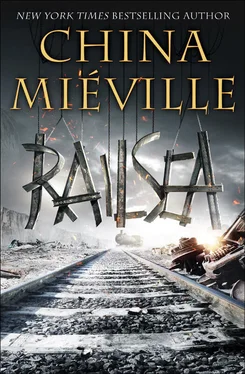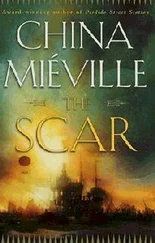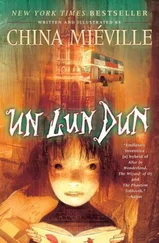Sham blinked. “ ‘S’alright,” he said.
“Not really it ain’t,” Vurinam insisted. “When I’m upset I rage around. I was like a mole on the hooks.” He looked at Sham at last. “I hope you’ll accept my sorry.” Pleasingly formal, he stuck out his hand.
Sham blushed. Fumbled & juggled with his bat. Freed up his own right hand & shook.
“You’re a gent, Sham ap Soorap,” Vurinam said. “What’s it called?”
“Eh?”
“Your daybat.”
“Oh.” Sham looked at it. He spread its wings. It chittered in annoyance but let him. He’d wracked his brains for memories of Fremlo’s lessons, consulted the doctor’s medical textbooks with extremely uncharacteristic rigour. Fingertip gentle, he’d found the spot in the wing where bone ground against bone, & set the fracture in the multicoloured wings with a tiny makeshift splint.
“It’s called … Day … Be,” he said. “Daybe.” The name was plucked from nowhere, in panic at the question, & he almost groaned to hear it. It was out now. Too late to take it back.
“Daybe.” Vurinam blinked. “Daybe the daybat.” He scratched his head. “I make no judgments. Daybe it is. It’s on the mend, I hope.”
“It’s getting better.”
“& Unkus?”
“Depends,” Sham said. “Dr. Fremlo says that depends how fast we get to Bollons.”
“Best get there fast then.”
They were caning through diesel. Doubly desperate to get to the island now, for fuel from the town’s plants, as well as for the sake of poor feverish Unkus, shivering & singing again, now, but not pleasingly. Caterwauling in delirium in the doctor’s hold.
ON A DRIZZLY DAY THE CREW SAW TRAINS AT THE rain-veiled horizon. Two, three, six, amid rocklets & islets & crowning nubs a few yards across, maybe topped with scrappy treelife & halos of birds. They saw dot-dot-dot sky punctuation of steam-train exhaust. A flat-topped cold volcano, a craggy irregular mountain, on its slopes the craggy irregular town of Bollons.
The western side of the island, facing Cambellia, that farthest shore, was mostly bare but for telescopy arrays. On its eastern side were the precarious-looking concrete & wood neighbourhoods of Bollons itself. As if the town didn’t want to look at the edge of the world. Houses & warehouses ran down the slope to the shore where the metal & wood & stone of the lines began, where diesel & steam trains puttered gently in the railsea bay. Sham saw the old halls his crewmates said were the guildbuildings of spies & ne’er-do-wells, where rumourmarkets were held.
“A few coppers’ll get you a questionable assertion from someone drunk & past it.” So Fremlo said. “A handful of dollars, something said with a straight face by one whose information has panned out more than once in the past. More than that, you’re into the realm of the tempting secret.
“You won’t get it from the source, I mean. The rumour-mongers sell them on.” They’d vouch for none of them, of course—that was the point. But if it were them , they’d tell their customers, they’d set more store by this story than that one—hence the higher price tag. & tell you what: buy this one, they’d throw in another—almost certainly the ravings of a feverish fantasist—free.
The Medes ran up flags telling any watchers who they were, & a bone-sign & red exclamation, to say there was an injury aboard. “Slow.” Captain Naphi’s voice on the intercom was more terse even than usual. She must be frustrated not to be pursuing her philosophy, Sham thought. They rounded harbour-edge rocks on which railgulls raucously announced themselves.
Railsailors watched them from other trains on the fanning-out rails of the inlet, each vehicle surrounded by carts, to ferry crews to land. A smokestacked steamer snorted a soot-cloud exactly as if in disdain. The Medes switched, backed & switch-backed towards the railfront. Veered close enough to another vehicle that it looked as if the figureheads were leaning in to kiss, short-sighted paramours. A diesel molar like the Medes . It was mostly moletrains there.
What were these other vehicles, though? Sham had no clue. They were smaller & stubbier than the hunters. The equipment he could see being oiled & readied was nothing he could name. It wasn’t salvage, he was almost certain. On a diesel train of strange design two men vigorously hand-cranked a chugging engine on caterpillar treads, from which protruded a long coiled tube, a glass-fronted helmet & brown bodysuit, in which someone performed ponderous gymnastics.
“What the Stonefaces is that?” Sham said. The pumpers had the brick-coloured skin & distinctive electronically tinkered & doohickey-enhanced goggle-glasses of Kammy Hammy, that secretive many-island nation of, supposedly, warlords.
“That?” Sham had been talking to himself, but Yehat Borr heard him, paused as he hand-scurried up a nearby ropeladder. He swung & spun & controlled his descent, stopping in front of Sham hanging upside down. “That,” Borr said, “is explorers.”
Of course. It was hardly as if it was just distant-ranging molers, fuel-hungry or desperate for something to eat other than old salted burrowmeat & weevily biscuits, who stopped at the town. Bollons was the nearest port to Cambellia. To Bollons came those brave brigands, pioneers & pillagers, to buy the whispers & the stories that surrounded such continents. Stories about the terrible engined angels, monstrous cousins to the protectors & repairers of the tracks, that guarded the edge of the world. Fables of how, one day, you might get past them, out of time & history. To epochs’ worth of dead & unborn riches. To all the prodigious treasures of Heaven.
Sham sniffed with what might have been desire, might have been something. In those explorers’ carriages would be rations, weapons, hiking gear. Maybe an overland carriage, monitors, trade goods for the peoples of the inland. Perhaps even mountaineering gear, for the most ambitious, like that woman now taking off the helmet & gesticulating thumbs-up at the pumpers.
An updiver. She wasn’t just going into Cambellia: she was going to climb. Beyond the border, roaming into uplands, to the limits of her cable, while the support crews waited below at the edge & pumped & kept her alive, or at least kept her breathing, till something other than the bad air, some bad-air beast or ghost of poisoned high ground, did for her instead.
A BUREAUCRAT TOOK MILD PITY. THE MEDES GOT A dockside mooring, shunting into place by the harbourmaster’s offices. En route it passed a navy train all the way from Manihiki: like many of the less muscular island nations, Bollons subcontracted its defence—& attack—to that great ferronaval power. Bored-looking officers in grey uniforms wandered up & down the rooftop decks, eyed the Medes , oiled their guns.
Sham was in the first lot out, going with Dr. Fremlo to deliver Unkus Stone into the hands of the local sawbones. He stepped off the gangway onto solid ground, cobbles that didn’t wobble, didn’t rock. It was an old cliché that the first step on hardland after weeks at railsea made you stumble again, the inertness of rock suddenly feeling mad as a trampoline. An old cliché but true: Sham fell over. His comrades cackled. He started to cringe, then stopped & laughed, too.
A local cart took Sham, the doctor, the captain & first mate, all fussing over the wildly delirious Unkus Stone, through narrow Bollons streets. Sham tended the wounded man as the doctor checked the dressings. He muttered in his head to That Apt Ohm, the great rotund boss-god, one of the few deities worshipped across the railsea, whatever the peculiarities of local pantheons. Bollons was ecumenical, granted church-licences to any deities whose worshippers could pay the fees. But the disrespectful worship of That Apt Ohm was taken more seriously there, pursued with more verve, than at most stops on the railsea. Sham had no idea quite what, if anything, he believed, but there seemed little harm in a quick silent word with one of the few gods whose name he remembered.
Читать дальше












